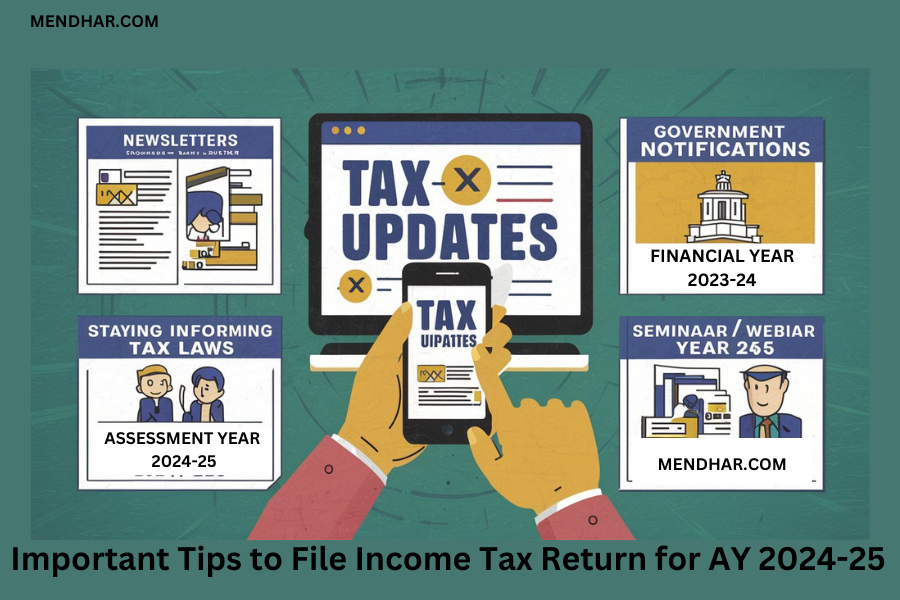Table of Contents
ToggleImportant Tips to File Income Tax Return for Assessment Year 2024-25:

Introduction: Tax season is upon us once again, and for many individuals, the process of filing income tax returns can be daunting. However, with the right guidance and understanding, it doesn’t have to be overwhelming. In this blog post, we’ll discuss some important tips to file your income tax return for the assessment year 2024-25, helping you navigate the process smoothly and efficiently.
Let’s define the assessment year 2024–25 before getting into the advice. The year that follows the financial year for which the income is being assessed is referred to as the assessment year. Therefore, the assessment year for income earned in 2023–2024 is 2024–2025. This distinction must be kept in mind when you file your tax returns.
Start Early filing return:
Starting early when filing your income tax return for the assessment year 2024-25 is crucial to avoid procrastination-induced errors and unnecessary stress. By commencing the process ahead of time, you afford yourself the opportunity to gather all necessary documents, meticulously review financial records, and seek assistance if needed. This proactive approach not only reduces the likelihood of mistakes but also provides peace of mind, allowing for a smoother and more confident tax-filing experience.Starting early is one of the most important pieces of advice for filing your income tax return for the assessment year 2024–2025. Delays can result in mistakes and needless tension. By getting started early, you allow yourself enough time to collect all the required paperwork, go over your financial records, and ask for help when needed.
Organize Your Documents:
Ensuring you gather all relevant documents before initiating the filing process is essential for a smooth and accurate tax return submission. Key documents such as Form-16 provided by your employer, bank statements detailing income and transactions, investment proofs demonstrating income from investments, receipts for claimed deductions like medical expenses or charitable contributions, and any other pertinent paperwork must be assembled. Organizing these documents beforehand streamlines the filing process, allowing for easier reference and verification of information. This systematic approach not only saves time but also minimizes the chances of errors or omissions, ensuring your tax return is complete and compliant with regulations.

Choose the Right Form:
Selecting the correct income tax return (ITR) form is paramount for accurate filing, particularly for the assessment year 2024-25. It’s imperative to meticulously assess your sources of income, residential status, and other pertinent factors to determine the most suitable form. Failure to choose the appropriate form may result in discrepancies, potential penalties, or delays in processing. Consulting the Income Tax Department’s website or seeking guidance from a qualified tax professional can offer clarity if you’re uncertain about which form aligns with your circumstances. Various ITR forms cater to different categories of taxpayers, such as individuals, Hindu Undivided Families (HUFs), businesses, and corporations. Factors such as income from salary, house property, capital gains, business or profession, and agricultural income influence the selection of the correct form. Additionally, considerations regarding eligibility for certain deductions or exemptions further impact the choice of form. By ensuring the accurate selection of the ITR form, taxpayers can uphold compliance with tax regulations, optimize tax benefits, and mitigate the risk of errors or discrepancies in their tax filings.
Declare All Sources of Income:
Being meticulous in declaring all sources of income is fundamental to accurate tax filing. It’s imperative to comprehensively disclose various income streams, encompassing salary, interest income, rental earnings, capital gains, and any other forms of revenue. Failure to report income accurately not only jeopardizes compliance but also carries potential penalties and legal consequences. Utilizing separate columns or designated sections in the tax return form facilitates clear and systematic declaration of each type of income. This structured approach enhances transparency and minimizes the likelihood of oversight or misrepresentation.
Salary income constitutes earnings from employment, inclusive of wages, bonuses, allowances, and perks. Interest income encompasses profits earned from investments in savings accounts, fixed deposits, bonds, or other interest-bearing instruments. Rental income pertains to revenue generated from leasing out properties, whether residential or commercial. Capital gains arise from the sale or transfer of assets such as stocks, real estate, or mutual funds, resulting in profits subject to taxation. Additionally, miscellaneous sources of income, such as freelance work, dividends, or royalties, should be diligently documented and disclosed.
By diligently declaring all sources of income, taxpayers uphold integrity in their tax filings, comply with regulatory requirements, and mitigate the risk of audits or penalties. Transparent reporting fosters trust in the tax system and ensures equitable distribution of tax burdens. Moreover, maintaining accurate records of income facilitates efficient tax planning and optimization of available deductions and exemptions. Ultimately, conscientiousness in income declaration is essential for fostering financial transparency and accountability.

Maximize Deductions and Exemptions:
Take advantage of available deductions and exemptions to minimize your tax liability. For the assessment year 2024-25, familiarize yourself with the updated list of deductions under various sections of the Income Tax Act, such as Section 80C, 80D, 80G, etc. Keep track of eligible expenses throughout the financial year to claim deductions effectively.
| Section | Description | Maximum Limit |
|---|---|---|
| 80C | Investments (e.g., ELSS, PPF) | ₹1,50,000 |
| 80D | Health Insurance Premiums | ₹25,000 (self) ₹50,000 (senior citizens) |
| 80G | Donations to Charitable Organizations | 50-100% of donation amount |
.Review Tax Credits: Check for any tax credits available to you, such as tax deducted at source (TDS), advance tax payments, or foreign tax credits. Ensure that you claim these credits accurately to reduce your tax liability. Cross-reference your Form-26AS with your TDS certificates to avoid discrepancies.
.E-Verify Your Return: After filing your income tax return online, don’t forget to e-verify it using Aadhaar OTP, net banking, or electronic verification code (EVC). E-verification eliminates the need to send a physical copy of the ITR-V to the Income Tax Department, making the process quicker and more convenient.
.Seek Professional Assistance if Needed: If you find the tax filing process complex or if your financial situation is particularly intricate, don’t hesitate to seek assistance from a tax professional. A qualified tax advisor can provide personalized guidance, ensuring that your returns are filed accurately and in compliance with relevant regulations.
.Stay Informed and Updated: Finally, stay informed about changes in tax laws, deadlines, and procedural updates issued by the Income Tax Department. Subscribe to reliable sources of tax-related information, attend seminars or webinars, and periodically review government notifications to stay abreast of developments that may impact your tax filing process.

Frequently Asked Questions - Income Tax Filing for Assessment Year 2024-25:
What is the assessment year 2024-25?
- The assessment year 2024-25 refers to the year immediately following the financial year 2023-24. It is the year during which income earned in the previous financial year is assessed and taxed.
When is the deadline for filing income tax returns for the assessment year 2024-25?
- The deadline for filing income tax returns for the assessment year 2024-25 typically falls on July 31st of the relevant assessment year. However, it’s advisable to check for any updates or extensions announced by the Income Tax Department.
Which income tax return (ITR) form should I use for the assessment year 2024-25?
- The choice of ITR form depends on various factors such as the nature of income, residential status, and specific circumstances. Refer to the Income Tax Department’s guidelines or consult a tax professional to determine the appropriate form for your situation.
What documents do I need to file my income tax return for the assessment year 2024-25?
- The documents required for filing income tax returns may include Form-16 issued by your employer, bank statements, investment proofs, receipts for deductions claimed, and any other relevant paperwork. It’s essential to gather all necessary documents before initiating the filing process.
How can I maximize deductions and exemptions for the assessment year 2024-25?
- To maximize deductions and exemptions, ensure that you avail of all eligible deductions under various sections of the Income Tax Act, such as Section 80C, 80D, and 80G. Invest in tax-saving instruments, such as ELSS, PPF, and health insurance, and make donations to eligible charitable organizations.
What should I do if I have multiple sources of income for the assessment year 2024-25?
- If you have multiple sources of income, be diligent in declaring each source accurately in your income tax return. Use separate columns or sections in the form to disclose different types of income, such as salary, interest income, rental income, and capital gains.
How do I e-verify my income tax return for the assessment year 2024-25?
- You can e-verify your income tax return online using methods such as Aadhaar OTP, net banking, or electronic verification code (EVC). E-verification eliminates the need to send a physical copy of the ITR-V to the Income Tax Department, making the process quicker and more convenient.



Pingback: How to Opt for the New Tax Regime or Stick with the Old -